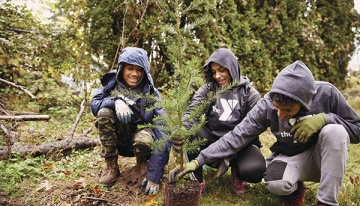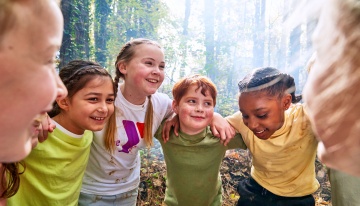Kids Need to Know We Believe in Them—And Their Future
When our kids were little, my husband and I often debated when they'd be ready to watch a particular movie, read a specific book or listen to the news with us. We were eager for them to engage with the world around them, but we also wanted to protect them from concepts and ideas they weren't yet ready to process.
 I was thinking about this recently because it seems each time I turn on the news or scroll through social media, there's a story about how hard it is to be a kid today, or about the declining prospects of the next generation.
I was thinking about this recently because it seems each time I turn on the news or scroll through social media, there's a story about how hard it is to be a kid today, or about the declining prospects of the next generation.
I was wondering how I would have managed my kids' exposure to these headlines if they were still young. Beyond deciding when your children are old enough to watch a scary movie or listen to a provocative song, how do you decide when they're ready to hear that adults believe life will be worse for them?
The news in general can increase anxiety and stress for young people, and so many of today's headlines—from war and conflict to mass shootings to climate change—directly affect our young people and their futures.
I know from what we observe in the Y's youth development programs, as well as from reports like the U.S. Surgeon General's advisory, that these topics are contributing to the stressors and mental health challenges young people are experiencing.
So, I was pleased to see in recent surveys, including one conducted by Boys & Girls Clubs of America, that young people feel hopeful about the future. A poll by Gallup found that 76 percent of Gen Z members believe they have a great future ahead of them, and those who report receiving encouragement from an adult are more than twice as likely to strongly agree they have a great future ahead of them. That's worth repeating: Caring, supportive adults have the power to double young people's belief in themselves.
Whether it's a parent, teacher, coach or mentor, we can help our kids understand, first and foremost, that they are unique individuals with the power to shape their own futures—not statistics in a news story with a predetermined outcome.
We also can nurture their optimism for their futures and offer support if they begin to consider what they personally can do to address the challenges facing their generation or their communities.
I believe we’ll make significant progress in addressing our country’s biggest challenges only if we get better at including our young people in our efforts.
Section 2
The truth is that we need their optimism, ideas and perspectives just as much as they need our encouragement and support. I believe we'll make significant progress in addressing our country's biggest challenges only if we get better at including our young people in our efforts.
A mantra you'll hear often in the Y is, "Nothing about us without us." It's a cue for staff and volunteers at YMCAs across the country to remember that planning for every project must include the people we're aiming to serve. If we miss this step, we're more likely to invest time and resources in programs that don't deliver the outcomes our communities want or need.
We must apply this logic to involving our young people—the generations who will inherit tomorrow's communities. They are up for it—I promise you. I've seen their passion and determination. I've heard their ideas. From our Youth & Government program to our national sports competitions, and from our Boys and Young Men of Color strategy to our camp counselors in training—I've met countless young people who are ready to shape a better future for themselves and for all of us.
In fact, in the Y we've invited some of these young leaders to be our thought partners in supporting and shaping the future of our organization. Our new Youth Advisory Council launched this summer with 14 young Y leaders, ages 16 to 23, and together they will advise and support me, my executive team and YMCA of the USA's National Board of Directors on emerging issues, opportunities and priorities. We're involving them in our decision making at the highest levels of our organization, and I know we will be better for it.
And so will they. The message we're sending is clear: We believe in them and their power to change the headlines of today into the future they want for themselves.





